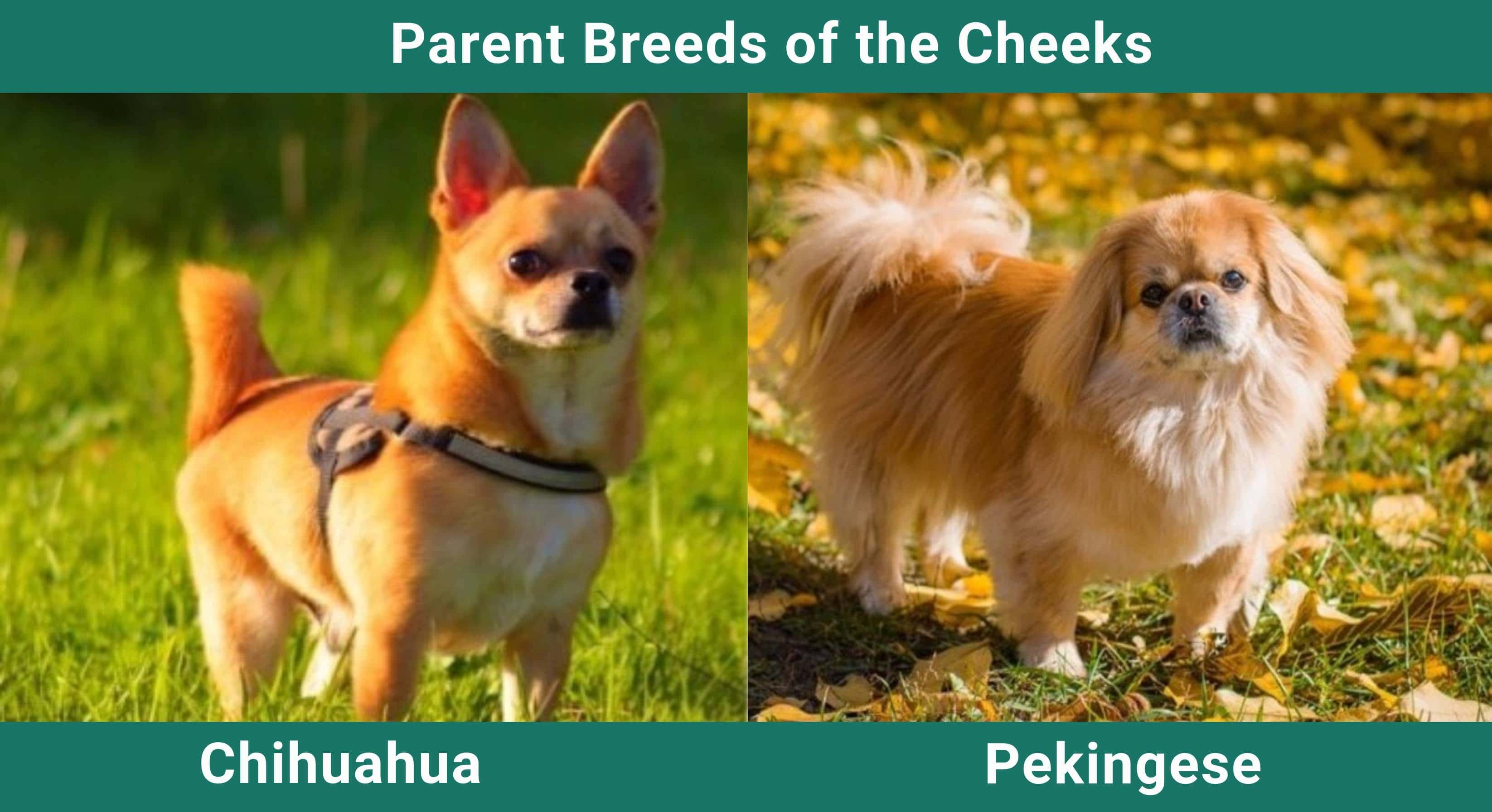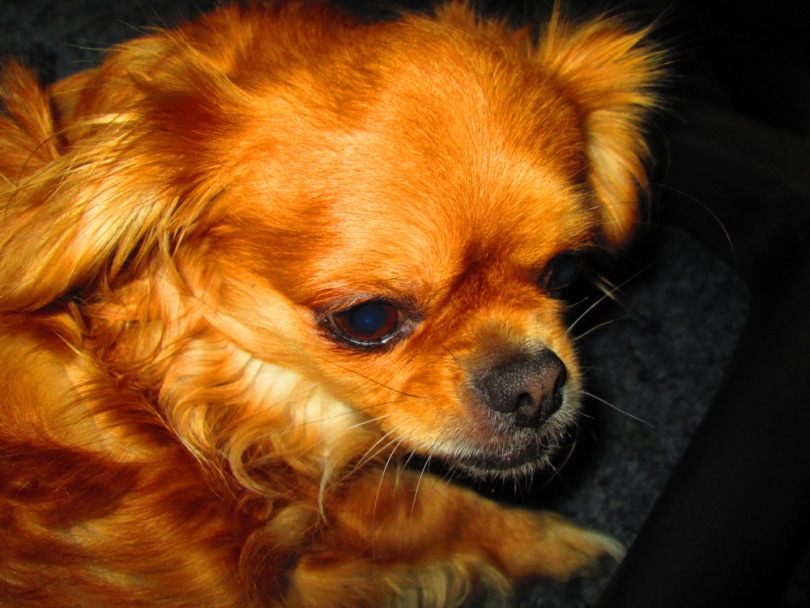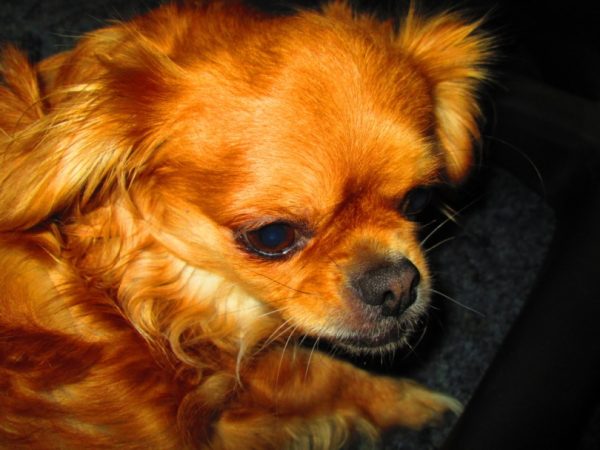Click Below to Skip Ahead
A combination of the Pekingese and the Chihuahua, the Cheeks is a small dog breed that adopts many of the traits of its parent breeds. It is alert and lively but does not require too much exercise. The breed is also smart and intelligent but can be wary around strangers and this may manifest itself as shyness or potentially as aggressiveness, making early and ongoing socialization critical in the ownership of the Cheeks dog.
Breed Overview
Height:
10 – 14 inches
Weight:
3 – 9 pounds
Lifespan:
10 – 14 years
Colors:
Black, blue, cream, red, white
Suitable for:
Seniors with limited mobility and living in an apartment
Temperament:
Loyal & Loving, Affectionate, Kind, Clingy, Sensitive, Wary
The breed adapts well to life in an apartment and because it does not require much exercise and appreciates a human that is around most of the time, it is a particularly good breed for seniors. The breed is tolerant of children, but it is very small so you must ensure that the kids know how to behave around such a small dog to prevent accidents and injuries.
Read on to find out more about this hybrid breed, to find out whether it is suitable for your family, and what is required to own and keep this dog.
Cheeks Puppies
The Cheeks is a designer or hybrid breed. This means that breeders have intentionally combined two purebred breeds to create a crossbreed that combines the benefits of the parent breeds. The Cheeks combine the Chihuahua and the Pekingese, both of which are small breeds that have proven popular with owners over the years.
Cheeks are a relatively popular breed. This means that you won’t have to stick with the first breeder you find. Draw up a list of potential breeders, speak to as many of them as possible, and try to look beyond factors like budget and proximity when making the final decision of which breeder to choose.
It is also possible to find Cheeks dogs in shelters. Try to get as much information as possible about the dog, but bear in mind that the shelter may have very limited information. Do ensure that you meet the Cheeks before adopting. Introduce your children or other dogs to the rescue and ensure that there are no signs of aggression.

Temperament & Intelligence of the Cheeks
The Cheeks is a lap dog. It will spend time asleep on your lap while you watch TV. It will follow you around the house while you do your jobs, and it will be ready for you when you return home. It can be shy around strangers, but early and ongoing socialization may help combat this.
Are These Dogs Good for Families?
The Cheeks is a good family dog. It will get along with seniors, adults, and children, although its tiny size means that very young children need to be especially careful around the pup. They can be a little nippy if they are treated too roughly, so youngsters and children must be both taught respectful behavior.
The breed may be reserved, or potentially shy, around strangers. They will warm to people over time, and ongoing socialization makes the process even easier. Like other small breeds, the Cheeks can suffer small dog syndrome, which means that the dog will be stubborn and believe that it rules the roost. It may also lead to aggressiveness or acute timidness.
Does This Breed Get Along with Other Pets?
Similar to their relationship with strangers, the Cheeks will not always get along with other animals. They are naturally wary of other dogs and can be similarly standoffish with cats and other smaller animals. They require socialization and introduction to other animals from a young age.
Things to Know When Owning a Cheeks:
The Cheeks will adapt to life in an apartment and is a good choice of breed for seniors, as well as families. It does not require too much exercise, either, being such a small breed, but it can be shy around strangers and this breed can be stubborn and yappy if not properly trained and socialized. It is a suitable breed for many owners, but not the perfect dog for all. Read on to see whether it is the right breed for you and your circumstances and to see what a Cheeks will require if you take one on as your pet.
Food & Diet Requirements
The breed is a small hybrid breed. Although lively, it does not have high energy requirements, and this combination of low energy output and small size means that the Cheeks has minimal daily food requirements.
Feed your Cheeks approximately one cup of food per day, and choose a high-quality and filling dry kibble. If you feed wet food, follow the manufacturer guidelines on the packet and if you feed a combination of dry and wet food, reduce the amount of both that you feed.
Exercise
The breed does not require a lot of exercise, and its small size means that too long and too frequent a walk could cause injury. One half-hour walk per day should be ample, and if you have a house with a yard, this can be supplemented with some healthy play. This breed does not usually do well or require canine sports or agility classes.
Training
Training will need to start early. They can be quite stubborn and to ensure positive training results, this means that you may spend a lot of time during training sessions waiting for them to do as you expect. Try to keep sessions short and fun, use positive training techniques, and be prepared to reward and lavish your dog with praise when they do what you want them to. You will need to provide early and ongoing socialization.
Both parent breeds can suffer from small dog syndrome, yappiness, and can nip if they feel threatened or are startled when asleep. Alternatively, they can be very timid with strangers. Socialization helps minimize timidness and ensures that the dog gets along with strangers and can handle new and seemingly frightening situations.
Grooming ✂️
Only bathe your dog when necessary, and no more often than every couple of months. Too frequent bathing can strip a dog’s coat of natural oils that provide protection. You should brush your Cheeks at least once a week, ideally twice, because this will help to spread the protective oils and it will remove dead hair and matted coat.
Starting when your dog is a puppy, brush your dog’s teeth at least three times a week, check their ears for signs of infection, and clip their nails when you can hear them clipping against hard floors. By starting when they are a puppy, you can ensure that the dog is comfortable and sits calmly for the grooming process.
Health and Conditions
The Cheeks is a generally healthy and hardy breed that will live approximately 12 years. Ensure a good diet and, although this hybrid does not need a lot of exercise, do ensure that it remains active and does have a short walk or brief exercise period each day, to ensure longevity and a healthy life. Look for signs of the following conditions and seek veterinary help if your Cheeks shows any symptoms.
- Eye problems
- Heart problems
- Skin problems
- Hydrocephalus
- Mitral Valve Disease
- Patellar Luxation
Male vs Female
The male of this hybrid species can grow a little larger but there is not a big difference, and there are no known or consistent behavioral differences between male and female members of the breed.

3 Little-Known Facts About the Cheeks
1. The Pekingese Was Kept By Chinese Royalty
The small Pekingese breed is a companion dog. Specifically, it was bred as a companion to members of Chinese royalty. Its history dates back to before 700 BC, making it an ancient breed. Legend has it that the Fu-Lin, or Lion Dog, was originally the offspring of a marmoset and a lion.
As well as being a small companion that would happily sit on the laps and at the feet of nobility, these prized canines were given as gifts to esteemed visitors. Through these gifts, the breed spread to Europe and the Americas. It was recognized by the American Kennel Club in 1906. The royal dogs were killed en masse in the early 20th Century, but those that had been gifted to foreign visitors survived and have helped give rise to the modern Pekingese breed.
2. The Chihuahua Is Recognized As the Smallest Dog Breed
The Chihuahua is also a small breed. It is widely acknowledged as being the smallest dog breed in the world. Miracle Milly, which is believed to be the smallest dog to have ever lived, was a Chihuahua that weighed less than one pound and was a minuscule 3.8 inches tall. On average, though, the feisty Mexican breed will reach a height between six and nine inches tall and will weigh around 5 pounds.
To be recognized by most kennel clubs, the dog must not weigh more than 5.9 pounds. The result of crossing the small Pekingese with the tiny Chihuahua is a diminutive hybrid breed. The Cheeks will stand at around 10 inches tall and weigh approximately 8 pounds.
3. The Cheeks Is a True Lap Dog
Both parent breeds are popular pets, and both were initially bred as companion dogs.
The Pekingese was a companion to Chinese nobility, while the Chihuahua is thought to have originated from a breed known as the techichi. This breed was popular first with the Mayan people and then the Aztecs. Although they, like people, were killed as a sacrifice to the gods, they were well treated and loved while they were alive. They were also buried with their owners so that they could keep them company in the afterlife, too.
The Cheeks is not known to suffer separation anxiety but it does prefer to spend time on your lap and at your feet, so be prepared for a very attentive pup.
Conclusion
The Cheeks is a hybrid dog breed that combines some of the attributes of the parent breeds: the Pekingese and the Chihuahua. It is a small dog that can live in an apartment or a home. It is suitable for living with seniors and will get along with other adults and children, although very young children should be supervised to prevent accidental injuries. Early socialization is important to help ensure that the hybrid breed gets along with strangers or, at least, is not too shy around them.
Minimal exercise is required but effective training means positively combating the stubborn nature of the breed, and you should be prepared for a dog that will spend every minute possible laid on your lap.
There are lots more Chihuahua Mixes and Pekingese Mixes listed in our guides!
Featured Image Credit: R-D-S, Shutterstock







